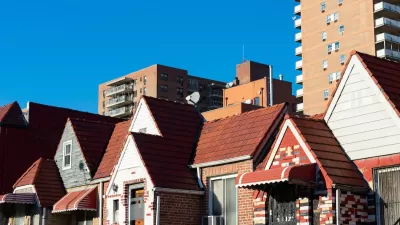The proposal to overhaul New York City’s zoning code, popular with voters, to make housing development easier faces opposition in the City Council.

New York City’s Planning Commission approved the proposed ‘City of Yes’ zoning reform package that would promote more housing development in the city, putting it one step closer to being implemented. But as Ethan Stark-Miller notes in AM NY, the proposal still faces opposition in City Council, primarily from council members representing low-rise outer-borough neighborhoods. “Yet a survey of 1,733 registered city voters released Wednesday told a different story — with 72% of those polled approving of the plan and only 22% opposing it.”
Dan Garodnik, chair of the commission, said the plan “is designed to maintain the character of various neighborhoods around the city, despite concerns that it would do the opposite.”
According to Stark-Miller, “The zoning text amendment contains eight core proposals including eliminating a requirement that new residential buildings add off-street parking, allowing developers who build affordable units in their projects to increase the number of dwelling units by 20% and over depending on the zoning district and authorizing small apartment buildings near all train stations.” The plan also supports office conversion and accessory dwelling units (ADUs).
On Wednesday, New York City Mayor Eric Adams, who has been a staunch supporter of the City of Yes plan, was indicted on five federal counts, throwing the rest of his administration into question.
FULL STORY: NYC Planning panel greenlights ‘City of Yes’ housing plan — but it still faces tough road in City Council

Trump Administration Could Effectively End Housing Voucher Program
Federal officials are eyeing major cuts to the Section 8 program that helps millions of low-income households pay rent.

Planetizen Federal Action Tracker
A weekly monitor of how Trump’s orders and actions are impacting planners and planning in America.

Ken Jennings Launches Transit Web Series
The Jeopardy champ wants you to ride public transit.

Washington Legislature Passes Rent Increase Cap
A bill that caps rent increases at 7 percent plus inflation is headed to the governor’s desk.

From Planning to Action: How LA County Is Rethinking Climate Resilience
Chief Sustainability Officer Rita Kampalath outlines the County’s shift from planning to implementation in its climate resilience efforts, emphasizing cross-departmental coordination, updated recovery strategies, and the need for flexible funding.

New Mexico Aging Department Commits to Helping Seniors Age ‘In Place’ and ‘Autonomously’ in New Draft Plan
As New Mexico’s population of seniors continues to grow, the state’s aging department is proposing expanded initiatives to help seniors maintain their autonomy while also supporting family caregivers.
Urban Design for Planners 1: Software Tools
This six-course series explores essential urban design concepts using open source software and equips planners with the tools they need to participate fully in the urban design process.
Planning for Universal Design
Learn the tools for implementing Universal Design in planning regulations.
Heyer Gruel & Associates PA
Ada County Highway District
Institute for Housing and Urban Development Studies (IHS)
City of Grandview
Harvard GSD Executive Education
Toledo-Lucas County Plan Commissions
Salt Lake City
NYU Wagner Graduate School of Public Service





























